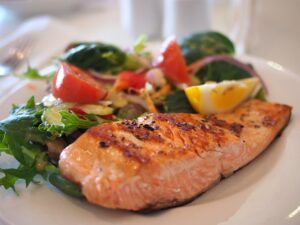What is Therapeutic Diet?
Diets are not only for weight reduction; they may also help you feel better about yourself. Patients undergoing treatment for a medical ailment may get recommendations for a therapeutic diet. A doctor or dietician generally recommends and designs this meal plan, which involves modifying the patient’s regular diet in little but significant ways.
Many people aren’t aware of this diet since doctors exclusively recommend addressing specific health issues. Many therapeutic diets emphasise avoiding all processed foods as a critical component.
Regardless of the therapeutic diet you are following; you should always consult with a healthcare professional before making any changes to your diet. Shivani Kandwal, the founder and nutritionist of Nutrivibes, was interviewed by the Onlymyhealth editorial team to learn more about therapeutic diets.
What Therapeutic Diets Can Do for You?
For several reasons, therapeutic diets may be used to treat a wide range of illnesses and disorders or enhance a patient or client’s eating skills. It is common for doctors to prescribe a particular diet as a part of the course of therapy for a disease or clinical condition to address a patient’s nutritional deficiencies and minimise the possibility of harm.
To maintain a healthy lifestyle or enhance health, dietitians also utilise therapeutic diets. Many dialysis patients, for example, follow dietary regimens that are therapeutic to their treatments to get the most benefit possible from their dialysis sessions.
Cardiovascular illnesses, such as coronary artery disease, hypertension, heart attacks, and stroke may all benefit from a therapeutic diet. People with diabetes, Crohn’s disease, ulcerative colitis, and celiac disease may benefit from a therapeutic diet. Restrictive dietary control is also effective in the treatment of food allergies.
Safety and injury risks are also a consideration for healthy control. Diet consistency may be affected by a person’s ability to swallow. Many therapeutic diets prescribed for patients with swallowing difficulties include chopped, pureed, or thickened liquids to reduce the danger of choking.
Many more individuals are becoming aware of the importance of nutrition in illness control and safety when they enter long-term care institutions or nursing homes. Due to the high number of residents with swallowing difficulties, choking events are every day in care facilities.
All personnel must be aware of each person’s specified diet, the safety reasons for rigorously following the recommended diet, and the ability to regularly monitor residents who have been put on dietary restrictions to decrease choking hazards and control illness.
Types of Therapeutic Diets
Diet duration relies on the individual’s reaction and any changes in their health problems. Allergies, sensitivities and other unpleasant reactions to limited foods may not need an indefinite elimination diet. For your health, only an expert can provide you with a proven and balanced food plan.
It would help if you didn’t attempt to alter your typical diet to suit your preferences or make it more convenient for yourself. A wide variety of therapeutic diets is recommended to individuals with distinct health conditions. For this reason, we have compiled a list of some of the most frequent types of therapeutic diet for you:
Dietary Supplement
This sort of therapeutic diet necessitates the presence of clear fluids. People who have difficulty digesting or swallowing solid food or experiencing other digestive problems should have their regular diet reviewed by a physician. Eating clear liquids such as electrolytes, Dal Ka Pani, and rice water is the first step in the clear liquid diet.
Diets Low In Cholesterol And Fat
Foods low in fat and cholesterol are included in this sort of diet. If you’re struggling with obesity or high cholesterol, you may want to look at this option as an option. Other items that should be avoided include cheese and processed foods like butter.
Diet For Food Intolerances
People with food allergies or intolerances should follow an intolerance diet. Eliminating the offending foods from your diet is the recommended course of action. A follow-up test might be performed if the symptoms return after some time without the offending foods.
A Diet High In Fibre
A high-fibre diet may also be suggested to those experiencing constipation and are on a weight-reduction plan. Acai berries and apples have a lot of fibre in them.
What are the Benefits of Therapeutic Diet?
For those with food allergies, intolerances, or other health concerns, therapeutic diets provide a comprehensive list of nutrients and food textures to include or avoid. Various health conditions may benefit from therapeutic diets. Therapeutic diets may cure or improve a wide range of diseases. Dr Shivani recommends that a therapeutic diet be followed in the following cases:
- Diabetes
- Renal insufficiency
- Food intolerance or allergy
- Irritable Bowel Syndrome (IBS)
- a long-term illness
- Illnesses of the digestive tract
- Celiac’s disease
Dietician Shivani Kandwal outlined the many therapeutic diets and suggested which individuals should adhere to each one. It’s possible to include a therapeutic diet into any medical treatment plan. You may have to limit your diet for some time, but this is for the benefit of your general health, so it’s worth it.
Diets For Diabetic Treatment
However, adopting a diabetic diet is one of the easier therapeutic diets to follow. Said, this diet is all about eating well. A balanced diet and regular meal times are encouraged by this programme.
Reasons Why You Would Want It
Those with diabetes or prediabetes must adhere to a diabetic diet to get the benefits of this nutritional regimen. The diabetic diet helps you maintain a healthy blood sugar level by ensuring that each meal is balanced correctly. Having too much sugar in your diet might cause a spike in blood sugar. This may lead to kidney, nerve, and heart damage due to hyperglycemia.
It Requires The Following
Diabetic diets must be balanced and consistent with being practical. To put it another way:
- Breakfast, lunch, and dinner are served three times daily.
- Measuring spoons and scales
- A diet rich in fibre, nutritious carbs, and heart-healthy fats, as well as fish
- Avoidance of trans fats, saturated fats, salt, and cholesterol.
There are specific components of the diabetic diet guidelines that we agree with here at PH2 Nutrition, but certainly not all of them. Insulin resistance is a problem in people with diabetes and prediabetes. To fix this, we prescribe a ketogenic diet for a few weeks or months for some patients until their bodies can process insulin again. In the case of others, we would place them on a diet that restricts carbs but allows them to be coupled with a fat or protein at the appropriate time of day.
Saturated fats, adequate sources of salt, and cholesterol are all critical for your body to generate hormone-like substances like stomach acid and other things; therefore, we disagree that you need to avoid them altogether.
You should visit a nutritionist if you need to follow a diabetic diet as a medical necessity. The plate technique and the glycemic index are just two numerous ways to ensure that your meals are balanced. Seek the advice of a specialist if you are unsure about which strategy is best for your body and lifestyle.
Physical Therapy And A Gluten-Free Diet
Many individuals have discovered that decreasing or eliminating gluten from their diet has health advantages beyond those with gluten sensitivity or wheat allergy, which is why the gluten-free diet was created. In recent years, many individuals have discovered that they are gluten intolerant. Some speculate that genetic changes in society or the usage of GMO crops may be to blame.
Weight reduction, more energy, and better overall health are expected benefits of the gluten-free diet. On the other hand, clinical research primarily concentrates on the advantages of the diet for patients with celiac disease.
Reasons Why You Would Want It
There are two proteins present in wheat (glutenin and gliadin) and barley and rye that form gluten when they are exposed to water. Bread and cereal are held together by gluten, “glue” in Latin. When gluten enters the body, it may cause an autoimmune illness known as celiac disease. There is no damage to the digestive system in non-celiac gluten sensitivity (such as stomach discomfort and a rash), but the same symptoms are still present (such as a headache).
Those who have gluten ataxia have difficulty controlling their muscles when they eat gluten protein. A wheat allergy may cause breathing problems and congestion in those who suffer from it. A gluten-free diet may help everyone since many individuals have experienced problems with gluten.
Finally,
Therapeutic diets, as opposed to general weight-loss plans that are meant to work for everyone, are created with a patient’s unique medical condition in mind. The gluten-free diet, for example, can only benefit you, but other solutions may only be suitable for a particular group of people. When it comes to healing or rehabilitation, it’s crucial to contact a nutritionist who can design a diet that meets your specific requirements.
FAQs :
-
What Are Five Therapeutic Diet Suggestions?
Gluten-free diets, clear liquid diets, complete liquid diets, no concentrated sweet diets, diabetic (calorie regulated) diets, renal diets, low-fat diets, high fibre diets, no added salts diets, and so on are some examples of regular therapeutic diets.
-
What Is A Therapeutic Diet, And How Is It Used?
It is a sort of diet that restricts the intake of certain foods or nutrients. This ensures that the person’s health does not deteriorate further. People being treated for a medical ailment are advised to follow a therapeutic diet.
-
What Should We Do To Be Ready For A Career In Clinical Nutrition?
Preparation for a career in clinical nutrition and dietetics: To pursue a profession in clinical nutrition and dietetics, we must first get a bachelor’s degree in dietetics, food and nutrition, or a similar field. Before pursuing a bachelor’s degree, a student should have studied biology in high school.
Also Read : All About Bland Diet : Foods to Eat and Avoid
















